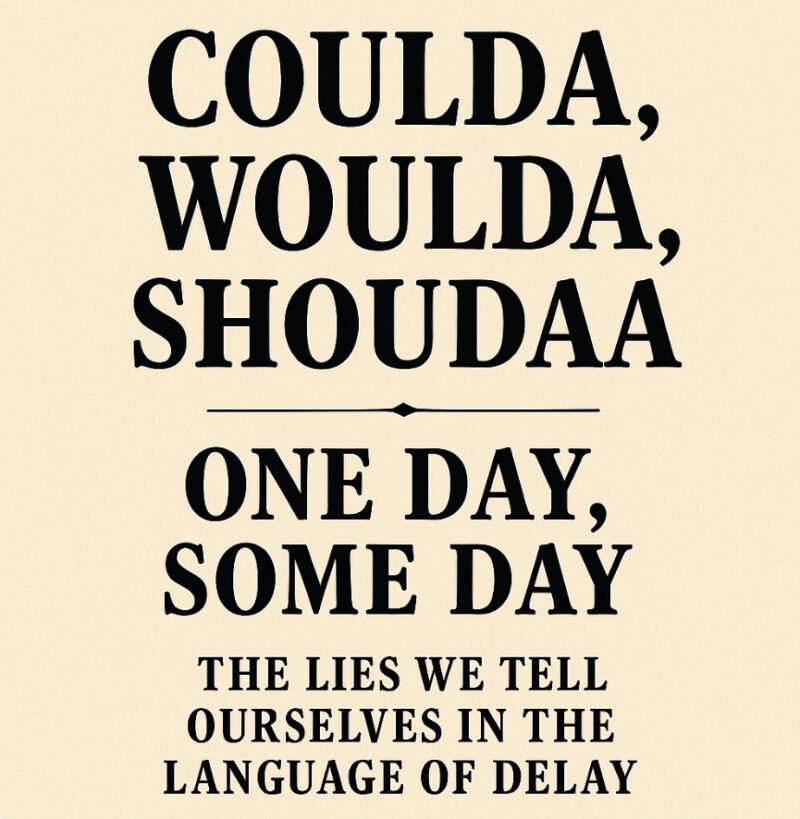Somewhere between “I could have” and “maybe someday,” entire lives vanish. Potential untapped. Dreams deferred until they dissolve. The unspoken tragedies of everyday people are not the ones made of fire and noise, but of slow erosion—goals we postpone, passions we silence, and truths we bury beneath obligations, fear, and fatigue.
We rarely notice when it starts. The first time we say, “I’ll do it later,” we believe it. Later feels like a promise. But it’s a trick mirror: later becomes next month, which becomes next year, which quietly dies in the graveyard of intentions.
The Quiet Seduction of Someday
“Someday I’ll write that book.”
“Someday I’ll leave this job.”
“Someday I’ll tell her how I really feel.”
Someday is a velvet coffin—comfortable, undisturbing, and lined with just enough hope to lull us to sleep. But someday is not a date. It’s not marked on your calendar. It requires no commitment, no risk, and no discomfort. That’s why it’s so appealing. It lets us feel like we’re still in the game, without ever having to get our hands dirty.
A friend of mine—let’s call her Claire—once dreamed of moving out of Utah and live a more metropolitan lifestyle. She would talk about it every time we met, her voice lighting up as she described the small apartment overlooking the Pacific, the daily coffee house visit, the Spanish she swore she was going to learn. She started taking a language class at the community college in Taylorsville. She bookmarked Airbnbs. She even picked out the name of the black cat she’d adopt.
That was thirty years ago.
She still lives in the same city, in the same neighborhood. She hasn’t visited a California beach in many years. Her Spanish? Rusted from disuse. Claire’s dream didn’t die in a blaze of heartbreak—it just faded. That’s how most dreams go. Not with a bang. With a gentle, unremarkable sigh.
The Other Side: Regret in Retrograde
“Coulda, woulda, shoulda.”
This is the mantra of hindsight. Regret’s lullaby. And it shows up when “someday” becomes “too late.”
Talk to someone in their seventies or eighties—really talk to them—and listen. Not to their accomplishments, not to the rehearsed stories they’ve told at parties. Listen for the silences. The half-sentences. The sudden change of subject.
“I was going to…”
“I had this chance once…”
“There was this girl I knew…”
These are the echoes of unlived lives. Of doors that were open once and never again. We treat time like an unlimited balance, and by the time we realize we’ve overdrawn, it’s not money we’ve lost—it’s the possibility of becoming who we might have been.
The Lie of Later
The world doesn’t care about our best intentions. There are no points awarded for good ideas left untouched or feelings never expressed. There’s no reward for the business plan still sitting in a notebook or the apology drafted a dozen times but never sent.
And yet we keep saying we’ll get around to it. Later. When things settle down. When the kids are grown. When the mortgage is paid. When we lose ten pounds. When we finally feel “ready.”
But readiness is a myth. Life will not send an invitation. No one achieves confidence by waiting for the stars to align. You move first, and the clarity follows.
A Story with Teeth
A man I knew well and hung out with in the 90’s, Joe (that’s his real name), was a fiercely intelligent, thoughtful, but a quietly tormented soul. He wanted to start his own art studio but stayed at a safe, if numbing, job for twenty years. Every time I saw him, I’d ask how the dream was going, and he’d grin, scratch his neck, and say, “Still cooking.”
At 59, he finally quit. He was tired of waiting, tired of hearing his own excuses. I helped him find a new home in rural Arizona, where he launched his studio, did his best work ever, and was living his dream—finally in motion, finally alive.
Never desiring fame or fortune, he continues today to enjoy the simple pleasure of artistic creation.
The Language of Delay
Coulda: I had the chance.
Woulda: I wanted to.
Shoulda: I knew better.
All past tense. All decay.
One day. Some day.
All future tense. All deflection.
We live our lives in these tenses and miss the present, where change can actually happen. Where risk, failure, beauty, joy, and reinvention reside.
Rewriting the Script
There’s a language more dangerous than hate. More seductive than love. It’s the language of delay, dressed in good reason. It asks nothing of you except postponement. It lets you keep your pride while robbing you blind.
But there’s another language. It doesn’t sound like a motivational poster. It’s quiet. Insistent. Honest. It speaks in actions, not affirmations.
It sounds like: “Today.”
It sounds like: “Now.”
It sounds like: “Enough.”
You don’t have to say it out loud. You just have to live it.
Final Thought
There are only two types of pain in the end: the pain of discipline or the pain of regret. One is hard. The other is haunting.
So ask yourself: which side of the coin are you flipping do you really want? It isn’t chance. It’s choice.
And more importantly, when will you stop flipping and place a bet on yourself?
Because you don’t get forever. You just get now.
And now is all you ever needed.
© 2025 Linda Allen
